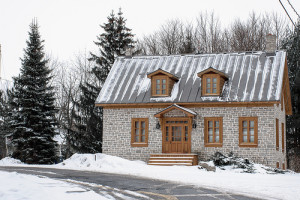 Whether you’re buying your first home or you are upgrading to another, purchasing a home can be quite an ordeal. From all the bids to the closing agreement, there are a lot of things you need to keep in mind so that your new home ends up as a place you want to spend a lot of time.
Whether you’re buying your first home or you are upgrading to another, purchasing a home can be quite an ordeal. From all the bids to the closing agreement, there are a lot of things you need to keep in mind so that your new home ends up as a place you want to spend a lot of time.
Getting to that point means finding a home that is right for you and doesn’t break the bank. For most people, it’s important to do a little investigating while you go through your buying process so you don’t end up in a home that needs more improvements than you can afford.
Along those lines, here are 10 things to look out for when purchasing a new (to you) home:
- The shape of the windows. One of the biggest things to look out for is the quality of the windows. A few things you might want to look for are wood rot, the age of the windows, how many panes there are (single, double, or triple), and if there’s any water or condensation.
- The shape of the roof. A poor roof can also be a huge problem to tackle for a new homeowner. Take a look at the shingles and check to see if they are curling up or if there are any areas throughout the roof that aren’t flat. This can be a sign that the roof needs to be repaired. Most good home inspectors will catch serious roof issues.
- The attic. Along with the roof, there is the attic, which isn’t exactly top-of-mind for many first-time homebuyers. Mold, mildew, and discoloration can all be a sign that the roof has a leak.
- Proper gutters and drainage. You also need to consider the quality of the gutters and the direction of the water as it drains away from the house. If there are dips in the yard or if the home is at the bottom of the hill, you’ll want to be sure you’re actually set up for proper drainage.
- Structural issues. You’ll also need to take a look at the foundation of your home. Check for any cracks or water issues that will give you an idea about what you’ll need to fix in the future. Again, a competent home inspector will be able to tell you if anything is wrong with your foundation. A cracked foundation can spell serious trouble, so be wary of homes with structural issues.
- Cover-ups. The drywall in the basement might look brand new, but what’s behind it is more important. Some homeowners will cover up issues such as moisture damage with new drywall and paint, so be aware. Also keep an eye out for DIY repairs that should’ve involved a professional instead.
- Which way the house faces. The way the house faces is also important for energy efficiency. Snow will typically melt much quicker off of houses facing south. If you’re serious about a house, visiting it during multiple times of day will tell you a lot about how much sunlight you can expect.
- Lead paint. Depending on the age of the house, lead paint can also be present. If you’re concerned about lead paint, most home inspectors will have the option to provide a lead inspection for an additional fee.
- What the neighborhood is like. You should also be mindful of the neighborhood and your neighbors. We suggest driving by the home at night to get a better idea of your environment, and meeting your neighbors if possible. You’ll have to come out of your shell a bit to do the latter, but remember that you’ll be living near these people for some amount of time!
- Street parking/quality of the street. Street parking can be an issue for people with multicar homes. You should also check to see if there are a large number of potholes or cracks that could require construction. If you’re going to need to park in the street, drive by the neighborhood several times at varying times throughout the day to see how much, if any, parking is available.
This isn’t a comprehensive list of everything you need to look out for, but it is a good start. Keep a careful eye as you go through your inspection, and don’t be afraid to ask questions. A home is a serious investment and you shouldn’t be afraid to spend a little more time up-front to ensure you end up in a house you love.
—
photo credit: Classic Home via photopin (license)
